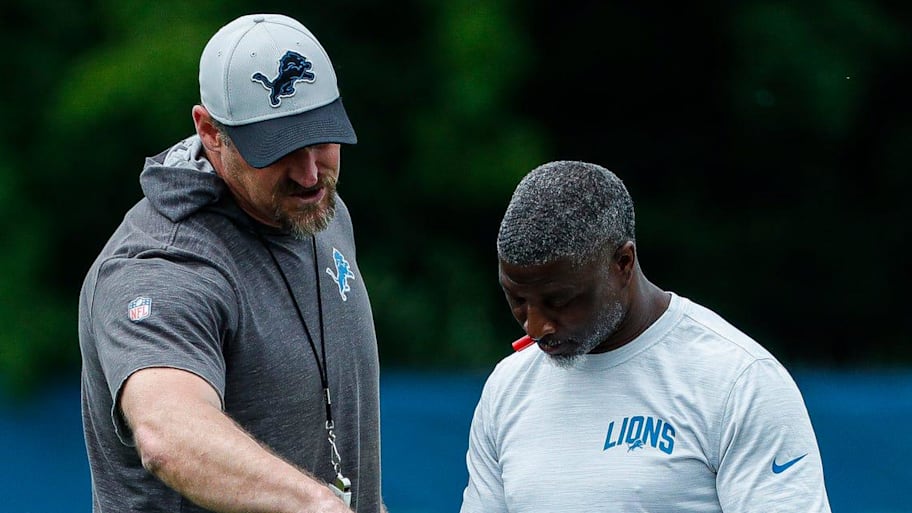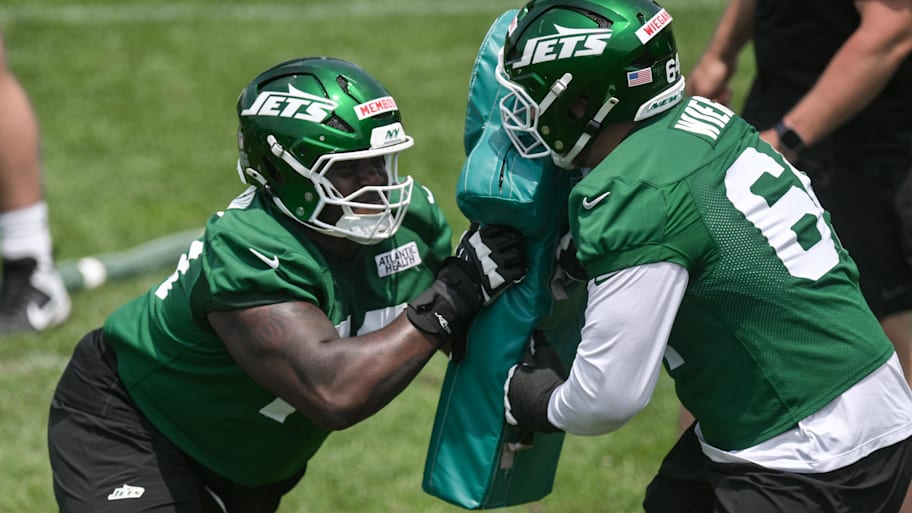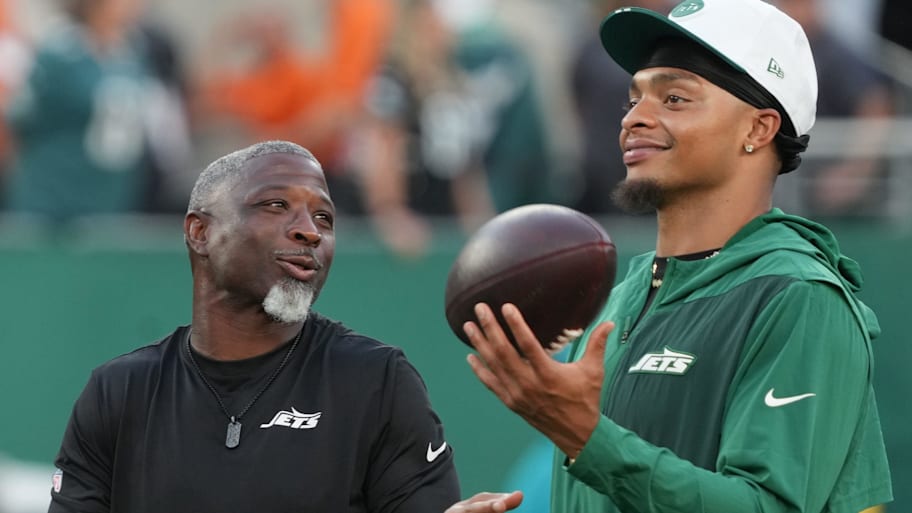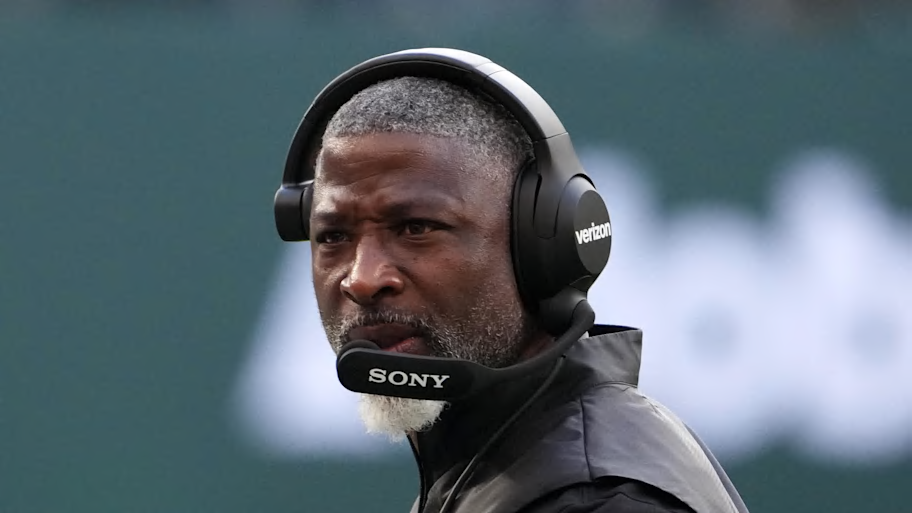Just before halftime Sunday morning, the Jets were playing a “home” game inside a soccer stadium halfway across the world from New York. File that under for the best.
Clouds vanished from the dank, dark skies that had been hanging overhead, at least in the literal sense. Gang Green was driving, down but only 10–6, against the playoff-caliber Broncos. The Jets’ defense had registered its first turnover—and not only that day but for the season. Their new head coach, Aaron Glenn, had returned as a defensive specialist; his credibility significant and earned. Already, he had become the first of 19 head coaches in team history to start a tenure with five losses. For this franchise, that is no easy feat. No team in NFL history had ever lost five consecutive to open a season and failed to record a turnover—until Glenn’s Jets did. Which is both a wild stat—those things would seem to tie together, no?—and a misleading one.
Anyway, the “home” crowd was cheering wildly and loudly enough to catch the roars on the television broadcast. The Jets hadn’t heard such volume from supporters since Jan. 5 of this year, in last season’s finale.
Not coincidentally, that date is also the last day they won a football game.
Everything, in other words, was different.
For an hour.
Then, poor clock management, a sputtering drive and the second quarter clock ran out. At once, this sequence appeared to be an exercise in playing it safe amid a season where there’s nothing to lose (except football games) and what’s hard to read as anything other than a fair and pronounced lack of confidence from Glenn in the offense, period—followed by a sideline confrontation between the team’s star wideout, Garrett Wilson, and his head coach.
In other words: J-E-T-S, Jets-Jets-Jets. (Sad trombone.)
It’s tempting to reach for the phrase embedded in my soul here. As the Jets’ beat writer for The New York Times from late October 2007 through the 2010 playoffs, I used the team’s name preceded by “Same Old.” The franchise hasn’t made the playoffs since that season, and hasn’t played a significant game since January of 2011. In 14 (mostly miserable) football campaigns since, the Jets have finished fourth in the AFC East seven times, and in the other seven years, they finished third or second, never first.
Time is a flat circle.
Same as it ever was.
This, though, is not that. Anyone making this argument should duck as they deliver it. I will. I am. Those other times—all those other times—fit within a pattern that consigned this franchise to NFL afterthought for more than a decade. For most of its existence, really. At least when Tim Tebow wasn’t running shirtless in the rain. Or when Aaron Rodgers was drawing attention, but not for an on-field rescue.
This looks like something else. (*Ducks.*) Squint, please. Can you see it? The echoes? How this, redundant but “putrid New York Jets football season,” might resemble another season, at the start of another extreme football makeover, in another place with a history that’s also more like a horror movie of losing and seesawing in approach and flat-out ineptitude?
Probably not. And that’s O.K. But maybe this, specific, still-putrid New York Jets football season is worth another, deeper look.

Jets and Lions parallels
Glenn became the head coach to say “I’m the one who will fix this” last spring. He labeled the pairing special, from the first announcement onward. Special because the Jets chose him out of Texas A&M in the first round of 1994’s draft. Special for the eight seasons he starred for this team in New York for two Pro Bowls, for the two return touchdowns over 100 yards and for his two years (2012 and ’13) he spent as a Jets scout that kickstarted his next football act.
The Jets, Glenn said, over and over, felt “like home.”
To which anyone familiar with the franchise’s tortured history might have asked (quite reasonably): Is that a good thing?
No one quibbled with Glenn’s coaching bona fides. He played for five separate franchises over 15 decorated seasons and led teams and motivated locker rooms. He coached in an indoor, Texas-based league, scouted, then moved into coaching full-time (Cleveland, New Orleans and Detroit).
In 2021, Glenn became a defensive coordinator for the first time with the Lions. This is where the Jets’ current season begins to echo Glenn’s first with Detroit. That ’21 Lions roster lacked critical elements possessed by winning football teams, such as talent. Harder still, the coaching staff wasn’t tasked with overcoming recent franchise ineptitude. No, sir. Those Lions lugged the heft of a losing history into each contest. That defense, his defense, yielded passing yards as if stocked not with cornerbacks or linebackers but with matadors.
Flash forward to 2025, in the week before game No. 6. The Lions were in Kansas City, dominant, again, at 4–1, set for a seismic regular-season clash with the count-them-out-at-your-own-peril Chiefs. The Jets were in London, where a sold-out crowd teemed with excitement to watch American football. They might have fully understood what that entailed with the Jets, especially with these Jets, who continued hunting for their first win.
Glenn didn’t exactly inherit the 1985 Bears’ famous D in his first time as an NFL head coach. The J-E-T-S finished last season ranked 24th in turnovers. In five games this year, they have allowed point tallies of 34, 30, 29, 27 and 37. They remained on a record pace, the worst kind, for most points yielded in a single season by the franchise. Again, that’s not a low bar. They still hadn’t recovered a single fumble or snagged even one errant pass attempt. Their defensive identity landed in the neighborhood of sieve.
The beleaguered coach of the cursed team attempted to draw out parallels to those Lions, in that season, when progress was there but not obvious, nor even present for long stretches. Detroit ranked toward the bottom of the league in most statistical categories.
Some laughed at Glenn’s parallel drawing. They should not have. *Former Jets beat writer ducks.*
There are, in fact, parallels to draw here. Like with those Lions, who, internally, as Glenn told reporters in New York this fall, expressed confidence amid frustration—and extolled patience when the season begged for a more drastic approach. Lions head coach Dan Campbell expressed this sentiment to Sports Illustrated, as part of reporting for the 2024 NFL preview magazine cover. That, in the NFL, some progress begins as the kind no one outside team headquarters can see. Even at 0–4. Or 0–8. Or 1-11-1.
As the clamor and hysteria ramped up for the Jets this fall, as it tends to amid decaying seasons that begin to rot right about when they start, as happens so often in those parts that lamenting the Jets is an assumed part of any given football season … Glenn expressed confidence in Steve Wilks, his defensive coordinator; him, in 2021. No, he wouldn’t call the plays. They would continue to imprint their plan, their culture. The dividends would be neither immediate nor guaranteed.
Glenn has proof that they could be realized—that season in Detroit.

Can Glenn replicate what they did in Detroit?
This is what the Lions did in 2021, using the reporting I gathered with fellow senior writer—and fellow Jets beat alum—Conor Orr before last season. Consider it a brief window into the largely unseen progress of pro football football.
They drafted well, selecting offensive tackle Penei Sewell (first round), Amon-Ra St. Brown (fourth, as he’s happy to note in perpetuity) and much-needed depth all over. Detroit traded for Jared Goff, believing the Rams had made mistakes in their evaluations of him. The Lions also signed more than a dozen free agents, none splashy, all necessary to inch forward. To do the tricky part.
The first steps in this process are always the most difficult to take.
Decision-makers then handed that overhauled roster to Campbell, who did his viral bite-their-kneecaps press conference as part of the second step in this season of unseen progress. His tone and hysteria were intentional, not, as more typically portrayed, the rantings of a football madman. He was speaking, Campbell told us, to his players. Campbell had a culture he had chosen and crafted, and it mattered to him so much that he would not deviate from the standard he planned to create—and did. He would imprint alongside trusted lieutenants like Glenn, then empower his players to carry the standard forward.
Together, Campbell and his staff untangled the draconian coaching methods of his predecessor, Matt Patricia. He asked team ownership to become more involved, and this, along with other tactics, formed an approach grounded in greater collaboration. Nobody made decisions from ivory towers. No approach was beyond reproach. Vulnerability begets trust, which began netting real, genuine buy-in. “Any team I’ve ever been a part of that had success—I mean, real success—leadership really came from the players,” Campbell told SI before last season.
That’s step two.
Through 11 games, those 2021 Lions lost 10 and tied one. They would go 3–3 the rest of the way, better football borne, in part, from player-empowered leadership and the firm standard they helped imprint. This marked real, objective progress—the type that could be seen, if anyone looked hard enough. Few did. But step three had been completed.
Campbell would become only the sixth coach in Lions history to register even a winning record—and only the third since 1972. Which happened the very next season, when Detroit finished 9–8. Step four. Culled from more of everything—better players; the standard, firmer; collaborative impact taking hold.
In comparison, the 2025 Jets, amid their own extreme makeover and long-distressed history, also took an offensive tackle high in the first round (Armand Membou) and, with six other selections between the second and fifth rounds, chose non-splashy players for critical roster enhancements. These Jets signed Justin Fields in free agency, believing Pittsburgh had made mistakes in its evaluations of him. They, too, added more than a dozen free agents, none splashy, all necessary to inch forward.
Then Glenn set about implementing his own culture. Most obviously, he jettisoned Aaron Rodgers and ended the Jets’ latest Tabloid Era. Again, no shortage!—all the unwanted attention and public back-and-forths—the very calculus this franchise historically embraces only to lament.
The question lingered—lingers: Can Glenn replicate what they did in Detroit?
Initial instinct, harsh but true: Not if they don’t find a better quarterback.

Progress is being made if you look hard enough
Can we dispense with the notion that Glenn returned to the Jets and, somehow, quite suddenly, became a bad football coach? We should. His defense last season in Detroit ranked first in the NFL in many statistical categories, from fewest rushing yards allowed to limiting third-down conversions to points per game to the passer ratings of opposing quarterbacks.
There are, of course, dozens of examples of elite coordinators in professional football who never could translate their brilliance in coordinator roles to running their own team. But these Jets aren’t 0–6—they lost to Denver, at “home,” in London—because Glenn screwed up the end of one first half or has become too distracted to imprint his defensive genius. They’re 0–6 because they lack depth. They’re 0–6 because they’re implementing, and that takes time. They’re 0–6 because Fields mustered just 45 passing yards (minus-10 net yards) against the Broncos, who registered almost as many sacks (nine) as their offense did points scored (13).
Wilson’s confusion and subsequent approach of Glenn wasn’t unusual, either, as both said afterward. Even Glenn declining to pin this latest putrid New York Jets football season on Fields alone should be considered not only fair but accurate. (Remember those point tallies allowed in the season’s first five weeks?)
In London, in the aftermath of a 13–11 game, football in nature and Fútbol on the scoreboard, Glenn clashed, mildly, with a reporter who asked a pertinent question about Fields’s status as the starter in the weeks ahead. Even that seemed understandable because Glenn seemed frustrated that those who evaluate his team couldn’t see what cannot be seen, not yet.
The calculus here will not change, not for a franchise with the Jets’ history. Any easing of angst or in perception will come from success. And that success must be sustained. Like, well, the Lions have done in Detroit. That’s the kind of change that upends narratives—and a soon-to-be 15-year playoff drought. It’s more drastic, more foundational, than cobbling together a few meaningless victories in 2025.
Plus, lose enough games this season and maybe the Jets will land Arch Manning next spring. If he stays in school at Texas, maybe they’ll draft Dante Moore of Oregon or Fernando Mendoza of Indiana. Point is, maybe Gang Green will get its Goff, who—*reporter ducks, once more*—is now a perpetual league MVP candidate.
For teams in this specific calculus—so bad they need to get worse to get better—unseen progress matters more than the obvious kinds. Glenn understands this because Glenn lived this, which guarantees, well, nothing. Not yet.
“Everything, to this point, that I envisioned with where we would be in three years,” Campbell told SI in 2024, “it’s here.”
The conversation around these Jets should focus on that, what they’ve done and what they will be, rather than their history and who they’ve been. Whether it’s Same-Old Jets for Glenn or a team that—*so much ducking*—returns to the postseason, whether next year or in 2027 or whenever, is a question that can only be answered over time. A question that’s not possible to answer now.
Squint, please. Can you see it? Favorable schedule ahead. Another draft next spring with, in all likelihood, an enviable draft slot. A foundation taking shape. Plenty of talent. More depth to augment that talent. But, you say, It’s the Jets! And you’re not wrong. You’re not exaggerating.
Just remember: Most said that about the Lions in 2021, too.
This article was originally published on www.si.com as The Jets’ Unseen Progress Compares Favorably to a Current Super Bowl Contender.
